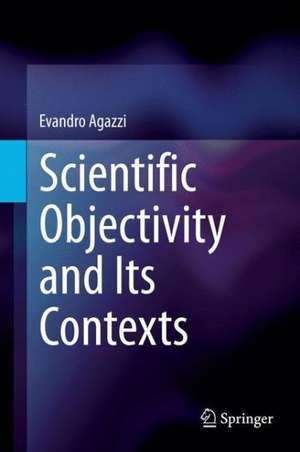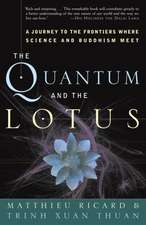Scientific Objectivity and Its Contexts
Autor Evandro Agazzien Limba Engleză Hardback – 27 mar 2014
| Toate formatele și edițiile | Preț | Express |
|---|---|---|
| Paperback (1) | 577.73 lei 38-44 zile | |
| Springer International Publishing – 3 sep 2016 | 577.73 lei 38-44 zile | |
| Hardback (1) | 588.95 lei 38-44 zile | |
| Springer International Publishing – 27 mar 2014 | 588.95 lei 38-44 zile |
Preț: 588.95 lei
Preț vechi: 736.19 lei
-20% Nou
Puncte Express: 883
Preț estimativ în valută:
112.69€ • 117.66$ • 93.27£
112.69€ • 117.66$ • 93.27£
Carte tipărită la comandă
Livrare economică 01-07 aprilie
Preluare comenzi: 021 569.72.76
Specificații
ISBN-13: 9783319046594
ISBN-10: 3319046594
Pagini: 482
Ilustrații: XVII, 482 p. 7 illus.
Dimensiuni: 155 x 235 x 33 mm
Greutate: 0.88 kg
Ediția:2014
Editura: Springer International Publishing
Colecția Springer
Locul publicării:Cham, Switzerland
ISBN-10: 3319046594
Pagini: 482
Ilustrații: XVII, 482 p. 7 illus.
Dimensiuni: 155 x 235 x 33 mm
Greutate: 0.88 kg
Ediția:2014
Editura: Springer International Publishing
Colecția Springer
Locul publicării:Cham, Switzerland
Public țintă
ResearchCuprins
Historical and Philosophical Background.- The Characterisation of Objectivity.- First Corollaries in the Philosophy of Science.- The Ontological Commitment of Science.- Scientific Realism.- The Contexts of Objectivity.- Corollaries in the Philosophy of Science.- Scientific Truth Revisited.- The Context of Making Science.- Science and Metaphysics.- Appendix.- References.- Indexes.
Recenzii
“The rich and wide-ranging book offers a critical dialogue with many contemporary philosophers, debates, and viewpoints. It includes ten chapters and one appendix on philosophical topics associated with the concept of scientific objectivity as the key to the scientific understanding of reality. … the book recommends itself because of its great clarity, while also deservig a careful reading because of the complexity of its structure and the organic unity of its parts.” (Marco Buzzoni, Journal for General Philosophy of Science, Vol. 47, 2016)
Notă biografică
Evandro Agazzi completed his studies in Philosophy at the Catholic University of Milan and in Physics at the State University of the same city. He became full professor of Philosophy of Science at the University of Genoa in 1970 and also held the chair of Philosophical Anthropology, Philosophy of Nature and Philosophy of Science at the University of Fribourg in Switzerland (1979-1998) and a chair in Philosophy in the Department of Humanities of the Autonomous Metropolitan University/Campus of Cuajimalpa of Mexico City (2009-2013). He taught as a visiting professor at the Universities of Düsseldorf, Berne, Pittsburgh, Stanford and Geneva, as well as at other universities for shorter times. At present he is Emeritus Professor of Philosophy at the University of Genoa and full Professor in the Department of Bioethics of the Universidad Panamericana of Mexico City. Professor Agazzi is President of the International Academy of Philosophy of Science (Brussels). He was also President, and is now Honorary President, of the International Federation of the Philosophical Societies (FISP), the International Institute of Philosophy (Paris). He has received many honors. He has been elected as a member of the Russian Academy of Sciences (2012) and the Mexican Academy of Sciences (2012). His publications include more than 70 books, of which he is the author and/or editor and almost 1000 papers and articles, including contributions to books, anthologies, encyclopedias and journals. He is the editor of Epistemologia, an Italian journal for the philosophy of science and is a consulting editor for several international journals.
Textul de pe ultima copertă
The first part of this book is of an epistemological nature and develops an original theory of scientific objectivity, understood in a weak sense (as intersubjective agreement among the specialists) and a strong sense (as having precise concrete referents). In both cases it relies upon the adoption of operational criteria designed within the particular perspective under which any single science considers reality. The “object” so attained has a proper ontological status, dependent on the specific character of the criteria of reference (regional ontologies). This justifies a form of scientific realism. Such perspectives are also the result of a complex cultural-historical situation. The awareness of such a “historical determinacy” of science justifies including in the philosophy of science the problems of ethics of science, relations of science with metaphysics, and social dimensions of science that overstep the traditional restriction of the philosophy of science to an epistemology of science. It is to this “context” that the second part of the book is devoted.
Caracteristici
The comprehensive summary of the author's life work Proposes a theory of objectivity that applies equally well to the natural sciences and the humanities Takes concepts and methodologies from traditional, analytic and continental philosophy and brings them to a fruitful complementary interplay in the philosophy of science Offers a clear methodological framework for interdisciplinary investigation Includes supplementary material: sn.pub/extras















